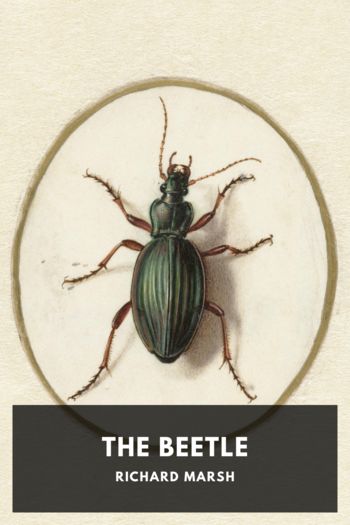The Beetle - Richard Marsh (top romance novels txt) 📗

- Author: Richard Marsh
Book online «The Beetle - Richard Marsh (top romance novels txt) 📗». Author Richard Marsh
One result is that Sydney has actually made a proposal of marriage—he of all people! It is too comical. The best of it was that he took himself quite seriously. I do not know how many times he has confided to me the sufferings which he has endured for love of other women—some of them, I am sorry to say, decent married women too; but this is the first occasion on which the theme has been a personal one. He was so frantic, as he is wont to be, that, to calm him, I told him about Paul—which, under the circumstances, to him I felt myself at liberty to do. In return, he was melodramatic; hinting darkly at I know not what, I was almost cross with him.
He is a curious person, Sydney Atherton. I suppose it is because I have known him all my life, and have always looked upon him, in cases of necessity, as a capital substitute for a brother, that I criticise him with so much frankness. In some respects, he is a genius; in others—I will not write fool, for that he never is, though he has often done some extremely foolish things. The fame of his inventions is in the mouths of all men; though the half of them has never been told. He is the most extraordinary mixture. The things which most people would like to have proclaimed in the street, he keeps tightly locked in his own bosom; while those which the same persons would be only too glad to conceal, he shouts from the roofs. A very famous man once told me that if Mr. Atherton chose to become a specialist, to take up one branch of inquiry, and devote his life to it, his fame, before he died, would bridge the spheres. But sticking to one thing is not in Sydney’s line at all. He prefers, like the bee, to roam from flower to flower.
As for his being in love with me, it is ridiculous. He is as much in love with the moon. I cannot think what has put the idea into his head. Some girl must have been ill-using him, or he imagines that she has. The girl whom he ought to marry, and whom he ultimately will marry, is Dora Grayling. She is young, charming, immensely rich, and over head and ears in love with him;—if she were not, then he would be over head and ears in love with her. I believe he is very near it as it is—sometimes he is so very rude to her. It is a characteristic of Sydney’s, that he is apt to be rude to a girl whom he really likes. As for Dora, I suspect she dreams of him. He is tall, straight, very handsome, with a big moustache, and the most extraordinary eyes;—I fancy that those eyes of his have as much to do with Dora’s state as anything. I have heard it said that he possesses the hypnotic power to an unusual degree, and that, if he chose to exercise it, he might become a danger to society. I believe he has hypnotised Dora.
He makes an excellent brother. I have gone to him, many and many a time, for help—and some excellent advice I have received. I daresay I shall consult him still. There are matters of which one would hardly dare to talk to Paul. In all things he is the great man. He could hardly condescend to chiffons. Now Sydney can and does. When he is in the mood, on the vital subject of trimmings a woman could not appeal to a sounder authority. I tell him, if he had been a dressmaker, he would have been magnificent. I am sure he would.
XXV The Man in the StreetThis morning I had an adventure.
I was in the breakfast-room. Papa, as usual, was late for breakfast, and I was wondering whether I should begin without him, when, chancing to look round, something caught my eye in the street. I went to the window to see what it was. A small crowd of people was in the middle of the road, and they were all staring at something which, apparently, was lying on the ground. What it was I could not see.
The butler happened to be in the room. I spoke to him.
“Peter, what is the matter in the street? Go and see.”
He went and saw; and, presently, he returned. Peter is an excellent servant; but the fashion of his speech, even when conveying the most trivial information, is slightly sesquipedalian. He would have made a capital cabinet minister at question time—he wraps up the smallest petitions of meaning in the largest possible words.
“An unfortunate individual appears to have been the victim of a catastrophe. I am informed that he is dead. The constable asserts that he is drunk.”
“Drunk?—dead? Do you mean that he is dead drunk?—at this hour!”
“He is either one or the other. I did not behold the individual myself. I derived my information from a bystander.”
That was not sufficiently explicit for me. I gave way to a, seemingly, quite causeless impulse of curiosity, I went out into the street, just as I was, to see for myself. It was, perhaps, not the most sensible thing I could have done, and papa would have been shocked; but I am always shocking papa. It had been raining in the night, and the shoes which I had on were not so well suited as they might have been for an encounter with the mud.
I made my way to the





Comments (0)